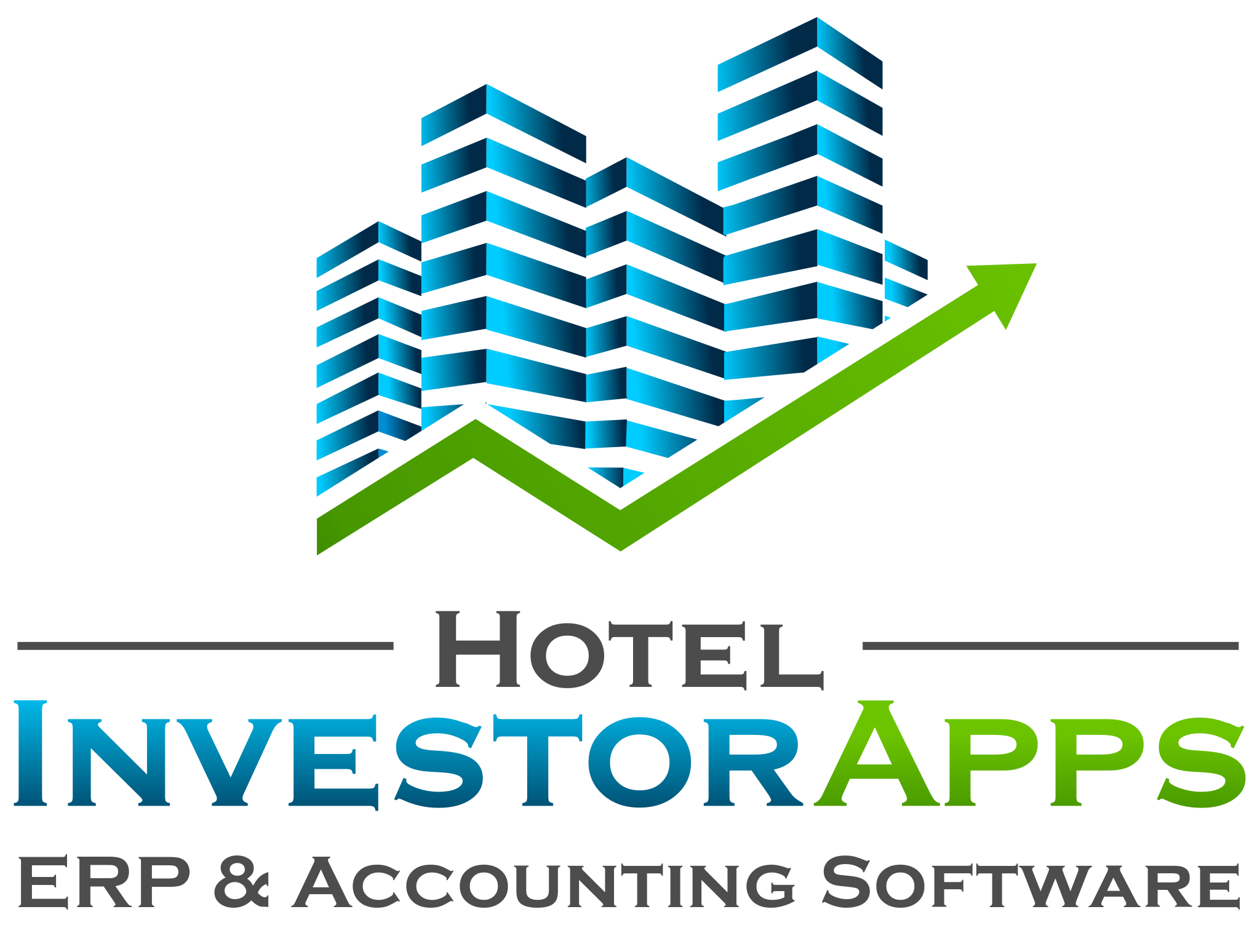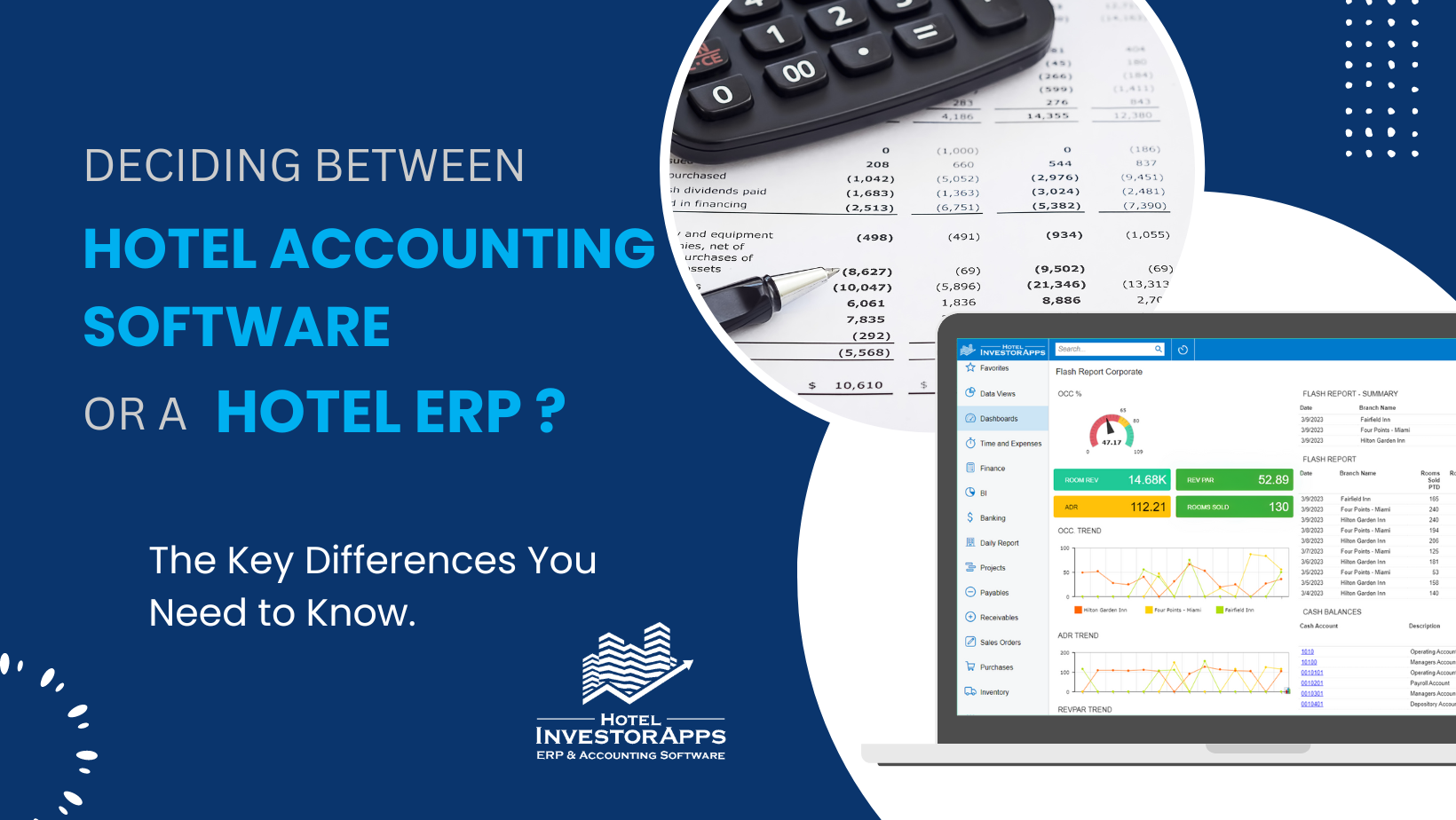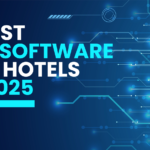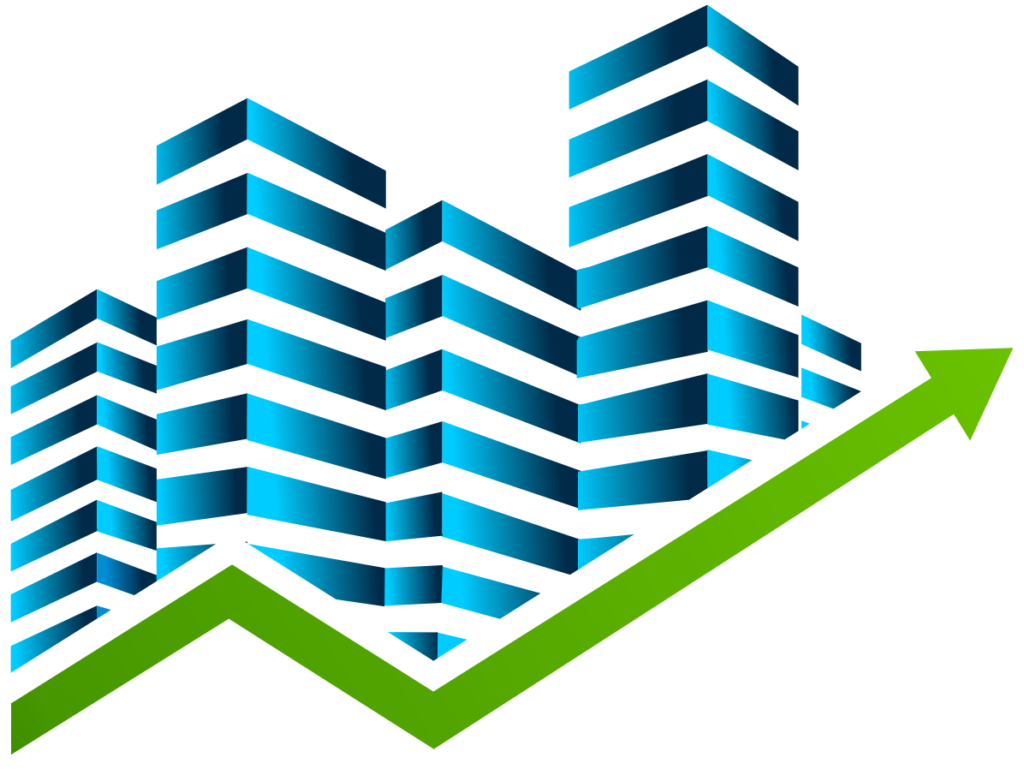Introduction
In today’s competitive hospitality industry, choosing the right back-office hotel software can significantly impact your hotel company’s efficiency and profitability. You need a system that provides real-time information on the financial health as well as performance of each hotel, and the portfolio. For financial well-being, it often boils down to a choice between specialized hotel accounting software and a comprehensive hotel ERP platform. Each solution has advantages depending on the needs of the hotel management or ownership group. In this blog, we’ll explore the key differences between these two types of software, helping you determine which is best suited to meet the specific needs of your hotel business.
A Quick Word on General Accounting Software
The hotel industry is unique, and hotel accounting is unlike standard business accounting. Hotel-specific accounting software offers greater accuracy of data and greater financial insight into your hotel business, as well as time-savings through the automation of routine tasks.
If you are using generic accounting software (not tailored to the hotel industry), you are likely missing:
- Hotel industry chart of accounts, such as USALI (U.S. Accounting for the Lodging Industry)
- Pre-built hotel financial statements
- A hotel daily report and automated importing of property management system (PMS) and point-of-sale (POS) data
- Bank reconciliation designed to handle the volume of hotel transactions.
Read more about “When and Why You Need to Switch to a Hotel-Specific Accounting System”
What is Hotel Accounting Software?
Hotel accounting software offers specialized functionality to manage financial and bookkeeping tasks specific to the hospitality industry. Compared to non-hotel accounting software, it facilitates hotel daily reporting, hotel financial reporting, and processes such as accounts payable and bank reconciliation. It also offers hotel-specific analytics to monitor key performance indicators. By integrating with hotel PMS and POS systems, it can automate routine tasks, thus reducing manual labor and increasing accuracy.
See the 5 Best Cloud-Based Accounting Software for Hotels
What is a Hotel ERP platform?
A hotel ERP (Enterprise Resource Planning) is a comprehensive system designed to unify and streamline hotel back-office operations on a single platform. A hotel ERP platform includes the capabilities of hotel accounting software such as a hotel chart of accounts, hotel daily report, hotel financial statements, as well as additional financial management functionality such as accounts receivable, intercompany accounting, budgeting, expense management, smart bank reconciliation, and role-based dashboards.
A hotel ERP can also cover other areas of back-office operations important in hotel management including fixed assets, purchase orders, inventory, project management, and project accounting. Lastly, in the hospitality industry, business intelligence is an essential aspect of a true hotel ERP for up-to-date analysis and insight on revenue and expense management, including labor management.
This integration of multiple functions on a unified platform greatly increases efficiency and accuracy as the hotel ERP is the single system of record and all modules communicate data seamlessly. A cloud-based hotel ERP means that all changes are instantly synchronized for a single source of the truth.
Learn more about the benefits of consolidated data on a single system of record here.
How to Tell the Difference between Hotel Accounting Software and a Hotel ERP
The key differences between hotel accounting software and a hotel ERP platform lie in the scope and functionality as well as the technology and user experience.
As you can see, the primary difference between hotel accounting software and a hotel ERP is the level of robust functionality and additional modules that an ERP brings to the table.
When is hotel accounting software the best choice?
Hotel accounting software will be the right choice for your hotel company if you have:
- A small hotel portfolio (1 – 5 hotels)
- No plans for significant expansion in near future
- An accounting team that is new to hotel accounting
- Management scope is limited to financial management
- No immediate need to integrate with other systems beyond PMS software
- Budget constraints and prefer a simpler solution
When is a hotel ERP platform the best fit?
Your hotel operational and ownership or third party management firm may be ready to upgrade to a hotel ERP platform if you have a:
- Medium or large size hotel portfolio
- Multi-industry portfolio
- Small portfolio with growth goals
- An experienced hotel accounting team
- Looking for increased efficiency across the back-office
- Desire to streamline processes, eliminate redundant work and reduce bottlenecks
- Need for visual dashboards to monitor relevant and critical information
- Looking for a consolidated platform across financial and operational departments
- Want business intelligence to control costs and monitor labor expense
- Want integrations with new or unconventional PMS or POS providers
- Want integrations with other service providers, such as HCM and payroll or tax automation
- Want advanced functionality for the hotel management company including intercompany accounting and accounts receivable.
What are the benefits of a hotel ERP platform?
In summary, a hotel ERP streamlines the hospitality back-office by consolidating various departments onto a single platform. A hotel ERP saves time by automating data imports through API connections, and through automated functionality and automated workflows. Greater efficiency and time savings facilitate timely financial reporting which then helps operations and the company function better as a whole.
Read more on Workflow Automation – 10 Ways it is Revolutionizing Hotel Accounting.
Case Study:
An example of the transformational power of a hotel ERP is highlighted in the Lark Hotels and Hotel Investor Apps case study, a short excerpt of which is below.
Lark Hotels and Hotel Investor Apps: Operational Transformation and Employee Empowerment
Lark Hotels, known for managing small luxury and boutique hotels, faced significant challenges with their outdated accounting system as they expanded their portfolio to over 50 properties. Despite delivering strong ROI and gaining recognition for their innovative concepts and design, their accounting processes were slow, required operational workarounds, and lacked visibility, resulting in additional staff-hours and inefficiencies.
In search of a solution, Lark Hotels partnered with Hotel Investor Apps (HIA), adopting their ERP & Accounting Software. This partnership brought transformational changes, including substantial time savings, improved visibility, and extensive automation. These improvements not only streamlined financial processes but also allowed employees to engage in higher-level tasks, fostering increased productivity, creativity, and empowerment. The ERP platform enabled Lark Hotels to restructure job roles, elevate employee positions, and enhance overall efficiency.
Read the full case study here: Lark Hotels Transformation
Next Steps Towards a Hotel ERP
If an ERP could be advantageous for your hotel company, look no further than the one true hotel ERP, Hotel Investor Apps ERP & Accounting Software (HIA). HIA’s advanced, all-in-one back-office platform offers enterprise-level accounting and business intelligence tools to transform financial, operational, and labor data for actionable intelligence, data-driven decisions, and more profitable hotel management. To see the scope of the benefits for your company, request a demo today!

Jaime Goss has over a decade of marketing experience in the hospitality industry. At Hotel Investor Apps, Jaime heads up marketing initiatives including brand strategy, website design, content, email marketing, advertising and press relations.










